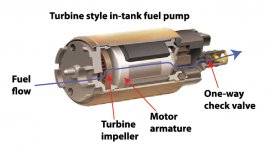Shel_B
Site Donor 2023
- Joined
- Aug 7, 2020
- Messages
- 5,167
Recently, I saw an auto care video in which the guru claimed that one should not consistently run your car with less than 1/4 tank of gas. Doing so could overheat the fuel pump and cause it to fail or work poorly.
I believe that, if it does happen, it would only happen on some cars in some situations, depending on their designs.
So, Fact or Fiction?
I believe that, if it does happen, it would only happen on some cars in some situations, depending on their designs.
So, Fact or Fiction?

